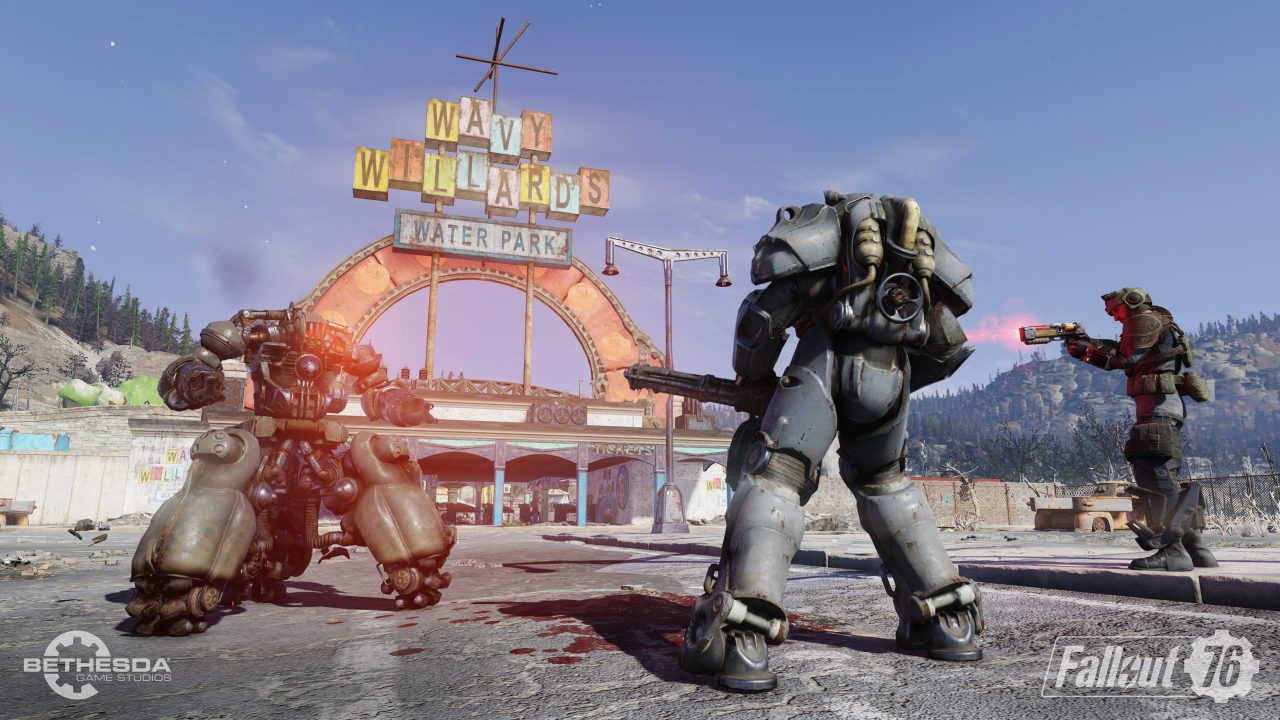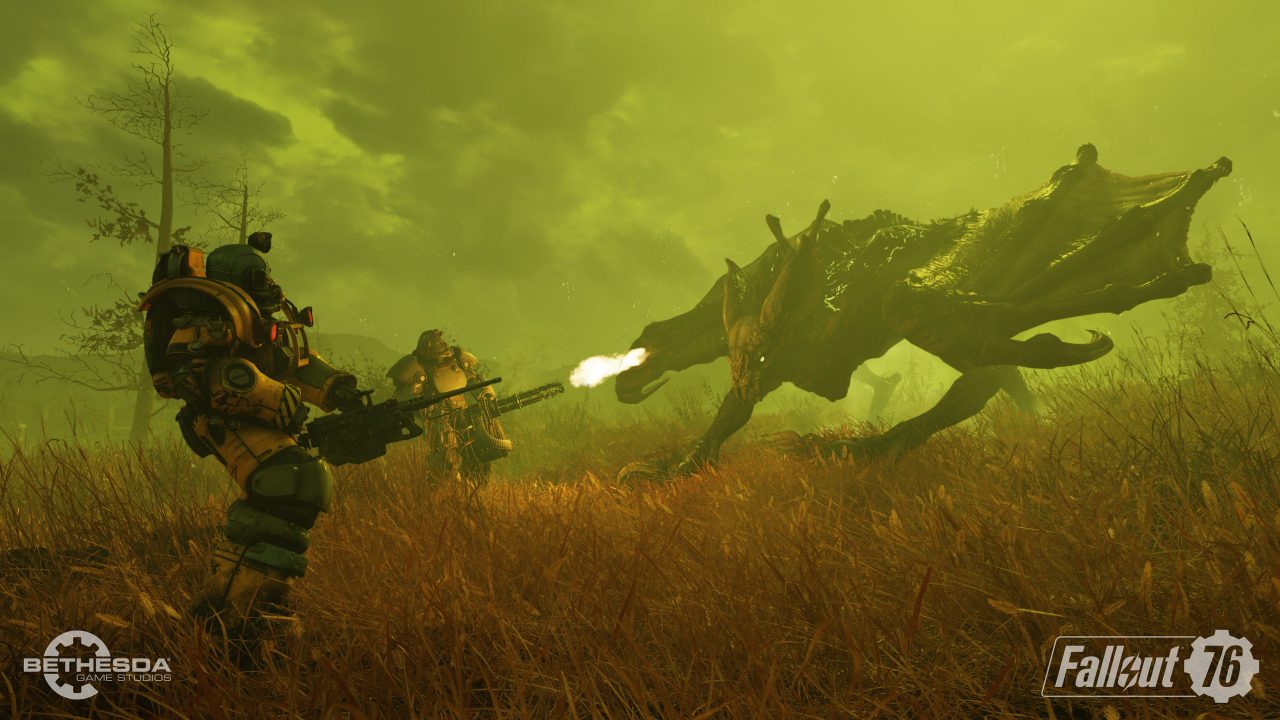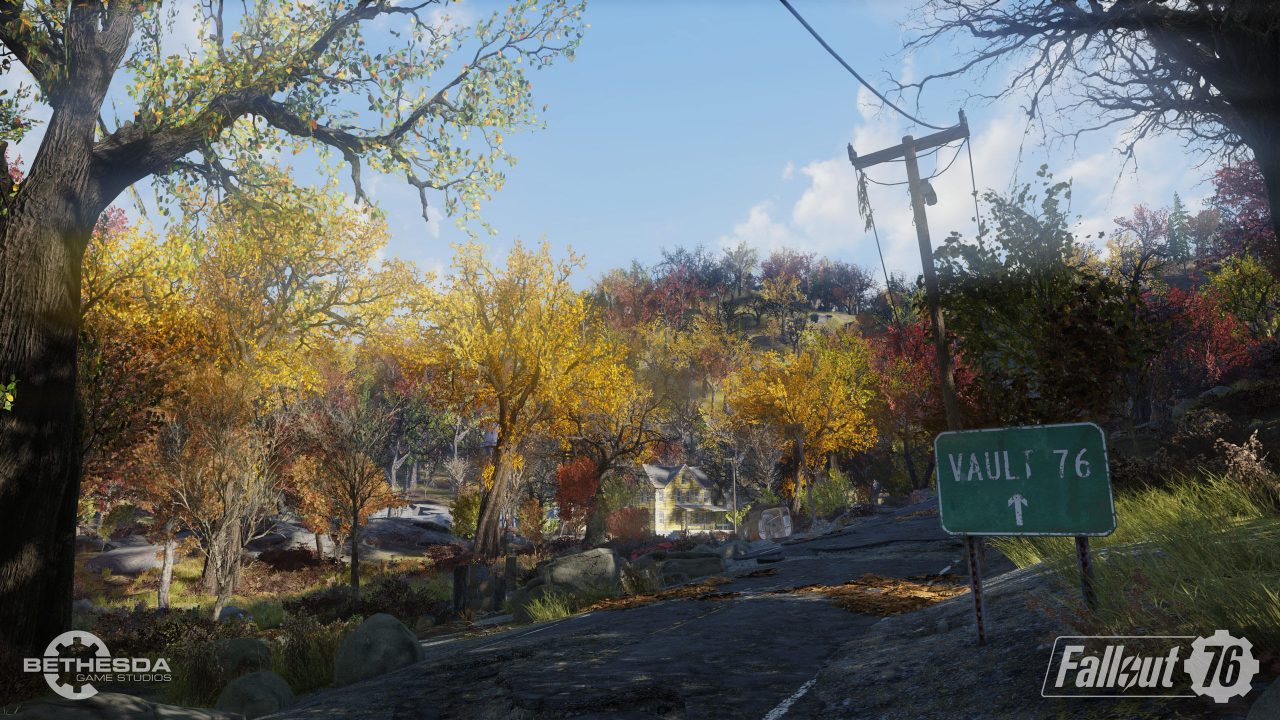My first moments with Fallout 76 were not promising. The Bethesda launcher opened, a test pattern appeared on my screen, and the app immediately crashed to the desktop. Oh, Bethesda. I successfully relaunched the game and was rewarded with what might be the most underwhelming and disappointing experiences of the year.
In Fallout 76, you are a resident of Vault 76, a control vault in West Virginia where America’s best and brightest survived a nuclear apocalypse. Now that the vault has reopened 25 years later, it’s up you to head out and rebuild the wasteland. But when you emerge, you discover an Appalachia empty of humanity; instead populated with angry Super Mutants, glitching robots, and an intelligent breed of Ghouls called the Scorched.
It’s a story about people struggling to survive in the face of overwhelming odds… and failing. Every single time. After hours of exploring, surviving, and interacting with my fellow players, I’ve concluded that Fallout 76 is the most depressing game I’ve ever played. The central gameplay loop works like this: You discover signs of life! You get a location and a task to rescue some survivors! You fight off waves of Super Mutants, Scorched, and ghouls to finally reach them! Oh wait, they’re dead. Sad. Repeat.
Fallout games are known for tales of tragedy pieced together from environmental clues and holotapes, but the difference here is that every other Fallout game actually has NPC survivors. People who have dug in after the apocalypse and survived in the face of overwhelming odds. There’s still some amount of optimism, whereas the general vibe of Fallout 76 is hopelessness. After the 20th quest where your reward is a sad pile of corpses, your motivation to find survivors gets a bit sapped. This sense of depression and defeat could have been overcome if the material rewards at the end of quests were equal to the time you put into them. But usually, your payoff ends up being something like two bottles of water, 20 caps, and a Stimpak. In other words, hardly worth your effort.
As per usual in Fallout games, Fallout 76 is at its best when you forget about the main storyline and wander around aimlessly looking for stuff. Like its single-player brethren, it excels in environmental storytelling. My primary source of enjoyment from the game was simply to explore and discover new locations. I only wish that the world didn’t feel so empty and bereft of life. Bethesda has infused the game with a sense of isolation and loneliness, which is puzzling as it’s supposed to be a multiplayer game.
Sadly, the multiplayer aspects of the game tend to conflict with the overall experience. If you’d rather a solo playthrough, you can complete the entire story and vast majority of the side quests yourself, without having to engage with anyone else. Even if you do decide to be a team player instead of a lone wanderer, the scope of your interactions is limited. Some players want to team up with you; others just want to get in a PVP fight (often following and harassing you if you don’t take the bait). Furthering limiting potential player interactions is that there are only 24 players per server. In a game world this large, that means you can play for hours without seeing anyone else.
When Bethesda bragged that every human you run into would be a “real person,” they missed something important: The other people playing the game are NOT characters. Unlike NPCs, players have few motivations aside from “shoot the things” and “collect the loot.” For engaging storytelling, you need characters with wants, desires, and a real stake in events as they unfold. And while Fallout 76 does have an abundance of well-developed, interesting characters, there is one problem: they’re all dead.
The vast majority of the story is motivated by characters speaking to you from beyond the grave on holotapes. To make matters worse, the dead apparently have nothing better to do than send you out on never-ending fetch quests (sounds like hell to me)! With this approach, it feels more like you’re cleaning up someone else’s mess than taking an active role in saving the world.
This lack of character interactions removes a vital part of the role-playing aspect of Fallout, where you have a choice to be helpful, evil, stupid, or a sarcastic jerk. There are simply no meaningful choices that can be made in this game. When a robot or holotape sends you on yet another fetch quest, you have no choice but to do it as given, with no alternative paths available to you. Further diminishing your ability to role-play is nothing you do has any lasting impact on the game world. As this is a multiplayer game, everything needs to be reset almost immediately for the next player, killing any sense of meaningful progression. You’re left feeling like nothing you do actually matters.
The gameplay feels like standard Fallout at first, but this vanishes the second you enter VATS (Vault-Tec Assisted Targeting System). Yes, Fallout has finally turned away from its turn-based legacy. Instead, VATS has become a sort of auto-aim, where you can target enemies in real time. Though the system works fine, it’s a pale shadow of VATS in previous games where time froze or slowed down to give you a second to catch your breath or rethink your strategy. This mechanic was understandably dropped, as it wouldn’t work in a multiplayer setting, but it unfortunately leaves you with only Fallout 76’s mediocre combat system. Add to this some of stunningly stupid and buggy enemy AI, and you get a combat experience that just isn’t much fun.
Another area where they watered down the roleplaying is the new leveling system. When you gain a level, you can assign one point to your SPECIAL stats (Strength, Perception, Endurance, Charisma, Intelligence, Agility, and Luck). Rather than choosing individual perks, you now use perk cards to mix and match skills and abilities. With every five levels gained, you get a randomized pack of cards (and a stick of gum). By combining and leveling up the cards, you can learn more advanced abilities. Though charming, this system is a significant simplification of most RPG leveling systems, not lending itself well to a complex character customization. It can also be somewhat irritating to have to switch out cards every time you want to hack a terminal or open a locked door.
The Pip-Boy interface makes a return, but its UI implementation is terrible, especially regarding inventory management. Between your inventory and your stash box, you don’t have enough room for all of your guns, armor, chems, ammo, food, and water. This leaves you constantly micromanaging your inventory. Even with careful item selection, you still frequently find yourself overburdened. Recent patches have given players more space in their stash, but it still doesn’t feel like enough for the collectathon nature of the game.
Graphically, Fallout 76 looks like a mod of Fallout 4 — which, essentially, it is. The few graphical upgrades Bethesda threw in cannot hide the fact that this game looks like it came out in 2015 (some might argue, even earlier than that). Even on ultra settings, it looks dated. This isn’t necessarily a deal breaker, as Fallout 4 was a decent looking game, and so is Fallout 76. In fact, the views of Appalachia can be quite pretty as you look out over the vast wilderness and rocky mountains.
I would argue that music is essential to creating that unique Fallout atmosphere. Thankfully, the usual eclectic mix of songs from the 40s, 50s, and 60s have made a return. Don’t worry, Atom Bomb Baby and Bongo, Bongo, Bongo made the cut! The in-game score is also fantastic, elevating the atmosphere of the environment. Hearing a sorrowful violin come in as you trek across the West Virginia countryside is just as affecting as the pulse-pounding music that comes in every time a gang of super mutants notices you. Adding to the strength of the sound design is the voice acting. I discovered some genuinely touching, funny, and tragic stories on holodisks during my tour of Appalachia, with some of the best acting found in the series. I only wish I got a chance to meet these characters.
The real tragedy of Fallout 76 is its squandered potential. Bethesda, the self-proclaimed savior of single-player games, announced that they would show us how multiplayer RPGs should be done, then failed spectacularly. Given another year of development, this could have been a remarkable game. Instead, we got an empty world, a meandering story, a failed concept, and a ton of irritating, game-breaking, bugs. Fallout 76 is an striking example of entirely ignoring what your competitors have already learned and instead blindly barrelling ahead, straight into a critical and commercial apocalypse.
But there is still hope. If Bethesda wishes to regain their customers’ trust, they need to invest their full resources into fixing Fallout 76, not unlike what Square Enix did with Final Fantasy XIV: A Realm Reborn. The skeleton of a great game is here. With frequent updates, added content, revamped systems, and improved fan outreach, Fallout 76 could become the game that everyone, including Bethesda, hoped it would be.







